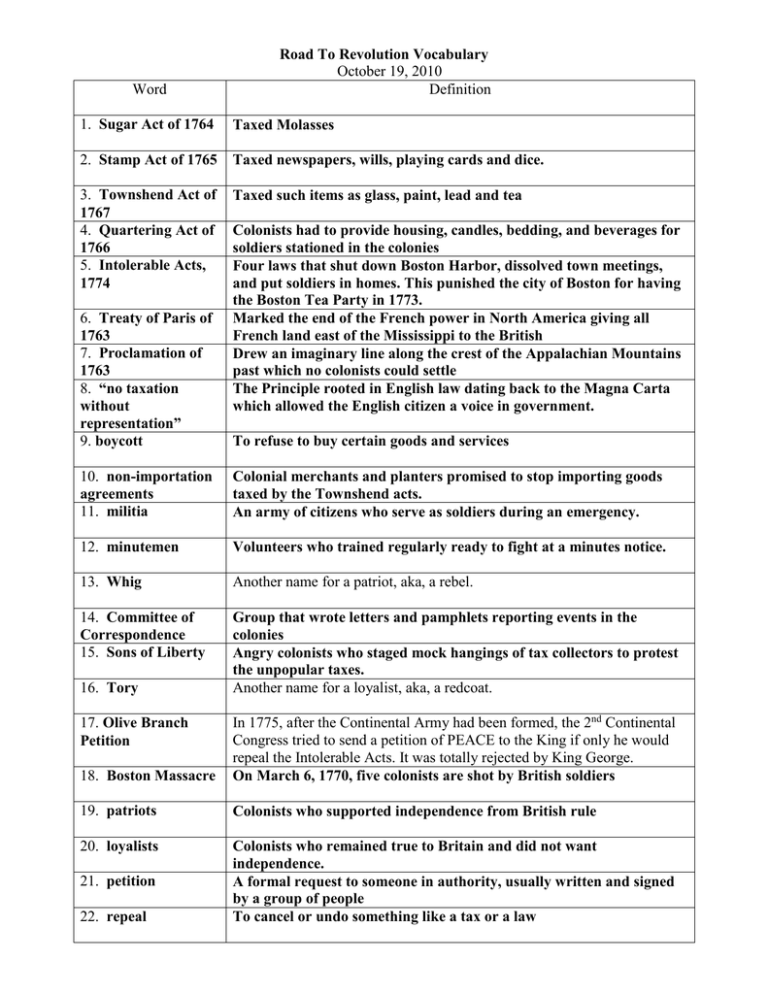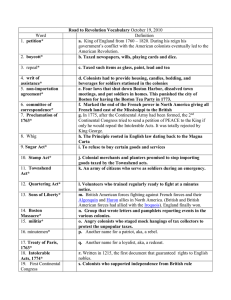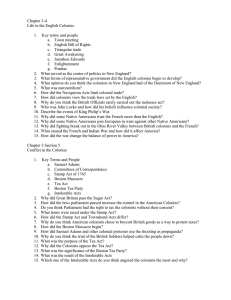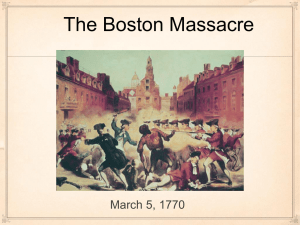Road To Revolution Vocabulary October 19, 2010 Word Definition 1
advertisement

Word Road To Revolution Vocabulary October 19, 2010 Definition 1. Sugar Act of 1764 Taxed Molasses 2. Stamp Act of 1765 Taxed newspapers, wills, playing cards and dice. 3. Townshend Act of 1767 4. Quartering Act of 1766 5. Intolerable Acts, 1774 Taxed such items as glass, paint, lead and tea 6. Treaty of Paris of 1763 7. Proclamation of 1763 8. “no taxation without representation” 9. boycott Colonists had to provide housing, candles, bedding, and beverages for soldiers stationed in the colonies Four laws that shut down Boston Harbor, dissolved town meetings, and put soldiers in homes. This punished the city of Boston for having the Boston Tea Party in 1773. Marked the end of the French power in North America giving all French land east of the Mississippi to the British Drew an imaginary line along the crest of the Appalachian Mountains past which no colonists could settle The Principle rooted in English law dating back to the Magna Carta which allowed the English citizen a voice in government. To refuse to buy certain goods and services 10. non-importation agreements 11. militia Colonial merchants and planters promised to stop importing goods taxed by the Townshend acts. An army of citizens who serve as soldiers during an emergency. 12. minutemen Volunteers who trained regularly ready to fight at a minutes notice. 13. Whig Another name for a patriot, aka, a rebel. 14. Committee of Correspondence 15. Sons of Liberty Group that wrote letters and pamphlets reporting events in the colonies Angry colonists who staged mock hangings of tax collectors to protest the unpopular taxes. Another name for a loyalist, aka, a redcoat. 16. Tory 18. Boston Massacre In 1775, after the Continental Army had been formed, the 2nd Continental Congress tried to send a petition of PEACE to the King if only he would repeal the Intolerable Acts. It was totally rejected by King George. On March 6, 1770, five colonists are shot by British soldiers 19. patriots Colonists who supported independence from British rule 20. loyalists Colonists who remained true to Britain and did not want independence. A formal request to someone in authority, usually written and signed by a group of people To cancel or undo something like a tax or a law 17. Olive Branch Petition 21. petition 22. repeal 23. writ of assistance 24. British East Indian Tea Company 25. Declaratory Act of 1766 26. First Continental Congress 27. French and Indian War 28. King George III 29. Magna Carta 30. Boston Tea Party Legal document that let a British customs officer inspect a ship’s cargo without giving any reason for the search In 1773, this company’s product was dumped into the Boston harbor in protest of the Tea Act. Britain’s attempt to assert its right to control the colonies through legislation and taxation. In 1774, The first meeting of delegates from 12 colonies met in Philadelphia to discuss the hated Intolerable Acts and agreed to boycott the buying of British goods nor the selling to the British. They also encouraged forming of militias. British American forces fighting against French forces and their Algonquin and Huron allies in North America. (British and British American forces had allied with the Iroquois). England finally won. King of England from 1760 – 1820. During his reign his government’s conflict with the American colonists eventually led to the American Revolution. The main cause involved not allowing the colonists representation in the English government. Written in 1215, the first document that guaranteed rights to English nobles. In 1773, the protests in which colonists dressed up as Indians and dumped British Tea into Boston Harbor






